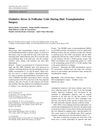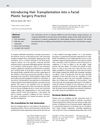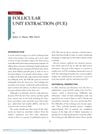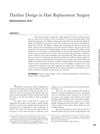 1 citations,
September 2023 in “Journal of cosmetic dermatology”
1 citations,
September 2023 in “Journal of cosmetic dermatology” Autologous FUE hair transplantation is effective and safe for treating hair loss due to scarring from infections.
1 citations,
September 2021 in “Dermatologic Therapy” Botulinum toxin injections effectively relieve pain from cutaneous leiomyomas.
 December 2023 in “Dermatologic Surgery”
December 2023 in “Dermatologic Surgery” The skin-responsive device improved beard and body hair transplant success and increased surgeons' willingness to perform the procedure.
 9 citations,
January 1995 in “Aesthetic Plastic Surgery”
9 citations,
January 1995 in “Aesthetic Plastic Surgery” New suturing technique with wider intervals and shallow stitches helps prevent scalp scars and promotes hair growth.
 8 citations,
July 2010 in “Aesthetic Plastic Surgery”
8 citations,
July 2010 in “Aesthetic Plastic Surgery” Adding more glutathione to the preservation solution doesn't reduce oxidative stress in hair transplants.
 11 citations,
December 1987 in “Aesthetic Plastic Surgery”
11 citations,
December 1987 in “Aesthetic Plastic Surgery” The document concludes that the hCG protocol may help in obesity treatment and could be scientifically justified, but more research is needed.
 10 citations,
January 2013 in “Journal of Cutaneous and Aesthetic Surgery”
10 citations,
January 2013 in “Journal of Cutaneous and Aesthetic Surgery” Narrower donor strips and special closure techniques in hair transplants lead to smaller scars and happier patients.
 December 2002 in “International Journal of Cosmetic Surgery and Aesthetic Dermatology”
December 2002 in “International Journal of Cosmetic Surgery and Aesthetic Dermatology” Scalp reduction surgery is safe and effective for certain patients with hair loss, leading to dense hair coverage and high satisfaction.
 2 citations,
July 2018 in “Facial Plastic Surgery”
2 citations,
July 2018 in “Facial Plastic Surgery” Hair restoration can enhance a facial plastic surgery practice with careful patient selection and detailed follow-up.
 3 citations,
August 2011 in “InTech eBooks”
3 citations,
August 2011 in “InTech eBooks” The document concludes that skin grafts are essential for repairing tissue loss, with various types available and ongoing research into substitutes to improve outcomes and reduce donor site issues.
 2 citations,
May 2005 in “Seminars in Plastic Surgery”
2 citations,
May 2005 in “Seminars in Plastic Surgery” The Juri Temporo-Parieto-Occipital Flap is a good option for scalp reconstruction and hairline restoration with a natural look, despite some risk of necrosis and scarring.

Choose the best brow lift method based on patient needs and goals.
 52 citations,
February 2012 in “Plastic Surgery International”
52 citations,
February 2012 in “Plastic Surgery International” Skin grafting is a key procedure for repairing skin defects, with the success depending on the right graft choice, donor site management, and aftercare.
 9 citations,
November 2008 in “Journal of Cosmetic Dermatology”
9 citations,
November 2008 in “Journal of Cosmetic Dermatology” Artificial hair implantation is generally safe and can restore hair when other treatments fail, but some patients may experience side effects.
 3 citations,
June 2019 in “Dermatologic Therapy”
3 citations,
June 2019 in “Dermatologic Therapy” Biofibre hair implant is a safe, effective treatment for baldness with 95% patient satisfaction.
 1 citations,
November 2009 in “Cambridge University Press eBooks”
1 citations,
November 2009 in “Cambridge University Press eBooks” FUE is a less invasive hair restoration method with potential to become standard, offering benefits like reduced scarring and pain, but requires experience to minimize risks.
 April 2018 in “Deleted Journal”
April 2018 in “Deleted Journal” Skin grafts are a common, minimally invasive way to close wounds in dogs, but better methods are still being sought.
 July 1998 in “Dermatologic Surgery”
July 1998 in “Dermatologic Surgery” Various techniques and tools for hair restoration were presented in 1998, including a mathematical model for donor area, use of lasers in surgery, methods for controlling grafted hair direction, and ways to increase graft yield. Satisfaction rates were around 39%, and studies showed trauma and dehydration can damage hair follicles.
 February 1997 in “Dermatologic Surgery”
February 1997 in “Dermatologic Surgery” Math skills are crucial for planning and executing successful hair restoration surgeries.
 119 citations,
January 2014 in “Indian Journal of Dermatology, Venereology and Leprology”
119 citations,
January 2014 in “Indian Journal of Dermatology, Venereology and Leprology” Platelet-rich plasma might help with hair growth and skin conditions, but more research is needed to prove its effectiveness and safety.
 25 citations,
November 2008 in “Facial Plastic Surgery”
25 citations,
November 2008 in “Facial Plastic Surgery” Dr. Michael Beehner recommends a personalized, careful approach to hairline design in hair replacement surgery for a natural look.
 8 citations,
October 2021 in “Indian Journal of Plastic Surgery/Indian journal of plastic surgery”
8 citations,
October 2021 in “Indian Journal of Plastic Surgery/Indian journal of plastic surgery” Hair transplants are mostly safe but can have minor complications.
 8 citations,
October 2018 in “Journal of the European Academy of Dermatology and Venereology”
8 citations,
October 2018 in “Journal of the European Academy of Dermatology and Venereology” Mohs micrographic surgery is effective for early-stage non-melanoma skin cancers on the lips, with basal cell carcinoma more common on the upper cutaneous lip and squamous cell carcinoma more common on the lower vermilion lip.
 1 citations,
April 2018 in “Lasers in Surgery and Medicine”
1 citations,
April 2018 in “Lasers in Surgery and Medicine” New treatments and technologies in laser medicine show promise for improving skin conditions, fat reduction, cancer treatment, wound healing, and hair restoration.

Plasma gel and PRP treatments improve skin and hair with minimal side effects.
 2295 citations,
August 2012 in “The international journal of transgenderism/International journal of transgenderism”
2295 citations,
August 2012 in “The international journal of transgenderism/International journal of transgenderism” The guidelines recommend informed consent for gender-affirming treatments and stress the importance of personalized, culturally sensitive care for transgender individuals.
 97 citations,
May 2008 in “Journal of Cutaneous Pathology”
97 citations,
May 2008 in “Journal of Cutaneous Pathology” Different soft tissue fillers can cause various skin reactions; biodegradable fillers are safer and non-biodegradable ones like silicone can lead to long-term problems.
 56 citations,
March 2016 in “International Wound Journal”
56 citations,
March 2016 in “International Wound Journal” Skin grafts are effective for chronic leg ulcers, especially autologous split-thickness grafts for venous ulcers, but more data is needed for diabetic ulcers.
 22 citations,
August 2010 in “Annals of Plastic Surgery”
22 citations,
August 2010 in “Annals of Plastic Surgery” The study concluded that reconstructive surgery for burn alopecia should be tailored to the scar's size and quality, with different methods recommended for different cases.
 20 citations,
March 1985 in “Journal of The American Academy of Dermatology”
20 citations,
March 1985 in “Journal of The American Academy of Dermatology” Genetic factors alone might not cause pemphigus vulgaris; other factors like birth complications and puberty may trigger it.




























